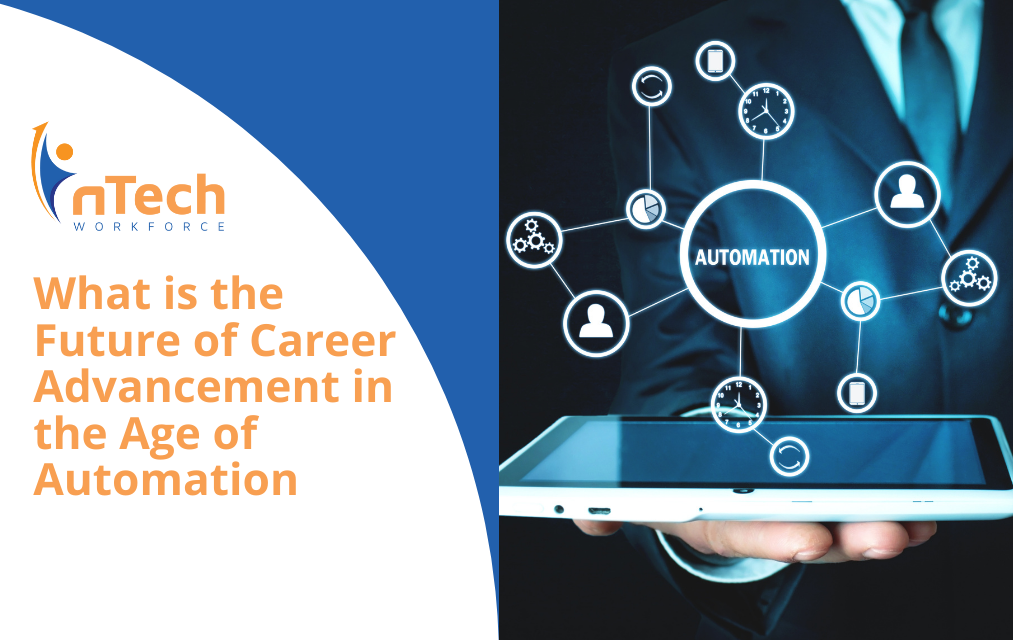How Might We Overcome Challenges and Barriers to Career Advancement?
The first two blogs of this series covered the business case and practical strategies for career advancement. In the last two blogs of this series,...
4 min read
Arthur Ransier : Dec 19, 2023 4:33:46 PM

Some say that the future of work is here, but I say that’s silly. The future is never here, and so for this last blog of the series, nobody can ever say I was wrong.
That being established, to put some boundaries around this last set of answers to forward-looking questions on career advancement, I will focus on the upcoming era fueled by automation, machine learning, and the broader artificial intelligence landscape. While some fear job displacement, others see new opportunities.
In this final blog, we dive into the evolving world of career advancement, exploring how automation will reshape the job market, the skills that will become crucial, and the strategies businesses can implement to prepare their workforce for this dynamic future. Join us as we unlock the secrets of thriving in the age of automation, where human ingenuity and technological innovation converge to create a new era of career possibilities. Let's navigate this transformation together, ensuring everyone has the tools and skills to claim their place in the future of work.
Automation is poised to play a double role in career advancement: both a disruptor and an enabler. While some repetitive jobs will be automated, new opportunities will emerge in areas like AI development, data analysis, and managing human-machine collaboration. The key lies in adaptability and upskilling. Individuals who embrace lifelong learning, develop critical thinking and problem-solving skills, and cultivate creativity and emotional intelligence will be best positioned to thrive.
Businesses must invest in training programs that equip their workforce with these future-proof skills, ensuring their employees can not only navigate the automation wave but ride it to new career heights. This shift will require a focus on continuous learning, personalized development plans, and agile skill development strategies. The future of career advancement won't be about outpacing machines, but about working alongside them, unlocking their potential to augment human capabilities and drive innovation.
In the automation-driven future, a new breed of skills will be the golden ticket to career advancement. While technical prowess remains important, the focus will shift towards human-centric skills that complement and enhance AI capabilities. Low-code technologies that exist today are a glimpse into a future when competencies like engineering, design, art, and communications are more about conceptualization, definitions, and optimization than the performance of manual tasks. Here's what I predict for in-demand skills:
Indeed, many of these skills are required among knowledge workers today, but the demand will increase. Why? Machines excel at repetitive tasks, but navigating complex problems, analyzing data, and formulating creative solutions will require human ingenuity. As routine tasks become automated, the ability to think outside the box and generate novel ideas will be increasingly valuable to businesses. Similarly, understanding the biases and limitations of AI and advocating for responsible development and implementation will be essential for a fair and equitable future.
Embracing these skills won't just open doors to new jobs; it will empower individuals to become active partners in shaping the future of work.
Navigating the automation wave requires proactive preparation. The state of workforce planning is a big opportunity for businesses; the catch-22 right now is that many human resources practitioners lack sufficient knowledge of the businesses in which they operate – which is required for effective workforce planning – while many aren’t given immersive opportunities to learn. More and more HR leaders showcase a sales or operations background, which creates opportunities in the future of work.
Good workforce planning means embracing a culture of continuous learning. This also means moving beyond traditional training programs and implementing agile skill development strategies. Personalized learning paths, micro-learning modules, and mentorship opportunities can empower employees to acquire the specific skills needed for their current roles and future aspirations. By fostering a growth mindset and providing ongoing support, businesses can ensure their workforce stays adaptable and confident in the face of change.
Furthermore, actively engaging employees in discussions on automation is crucial. Transparency about automation plans, involving them in discussions about future roles, and offering reskilling opportunities can build trust and mitigate anxieties. By working collaboratively, businesses can harness the power of their human capital and leverage automation to achieve greater success, both for the organization and its employees.
In the age of automation, ethical and responsible AI practices hold the key to unlocking equitable career advancement opportunities for all. Biased algorithms can perpetuate existing inequalities, while lack of transparency can fuel distrust and hinder progress. Businesses must prioritize fairness and transparency in AI development and implementation. This includes:
By prioritizing ethical AI practices, businesses can create a level playing field where individuals, regardless of background or circumstance, have equal opportunities to advance their careers based on their skills and contributions. This isn't just the right thing to do; it's also the foundation for building a diverse and thriving workforce that benefits everyone.
The future of technology for career advancement holds immense potential to democratize access to opportunities and empower individuals to take control of their professional journeys. Embracing these technologies and fostering a culture of continuous learning is about ensuring a future where everyone has the tools and support to reach their full potential and maximize economic outcomes. Here are just a few technologies to keep an eye on:
These are only glimpses into the full potential. Businesses and workers alike imagine a future where career advancement isn't just a climb, but a thrilling exploration of possibilities.
Remember, career advancement is smart business. The future of work is about people and machines working together, not robots taking over. It's about using our collective knowledge and competencies to get work done. Career advancement is a collaborative path paved by continuous learning, ethical innovation, and shared commitments.
At nTech Workforce, we believe in, see, and understand the transformative power of opportunity, work, and technology. We strive to partner with businesses and communities to build winning teams to meet immediate goals while aligning strategic workforce plans to future-proof businesses against talent gaps.

The first two blogs of this series covered the business case and practical strategies for career advancement. In the last two blogs of this series,...

When you hear “temporary work,” your first thought might be, “It’s just a placeholder until I land something better.”

Technological advancements are soon expected to replace many manufacturing workers. While manual labor is still needed in modern manufacturing...